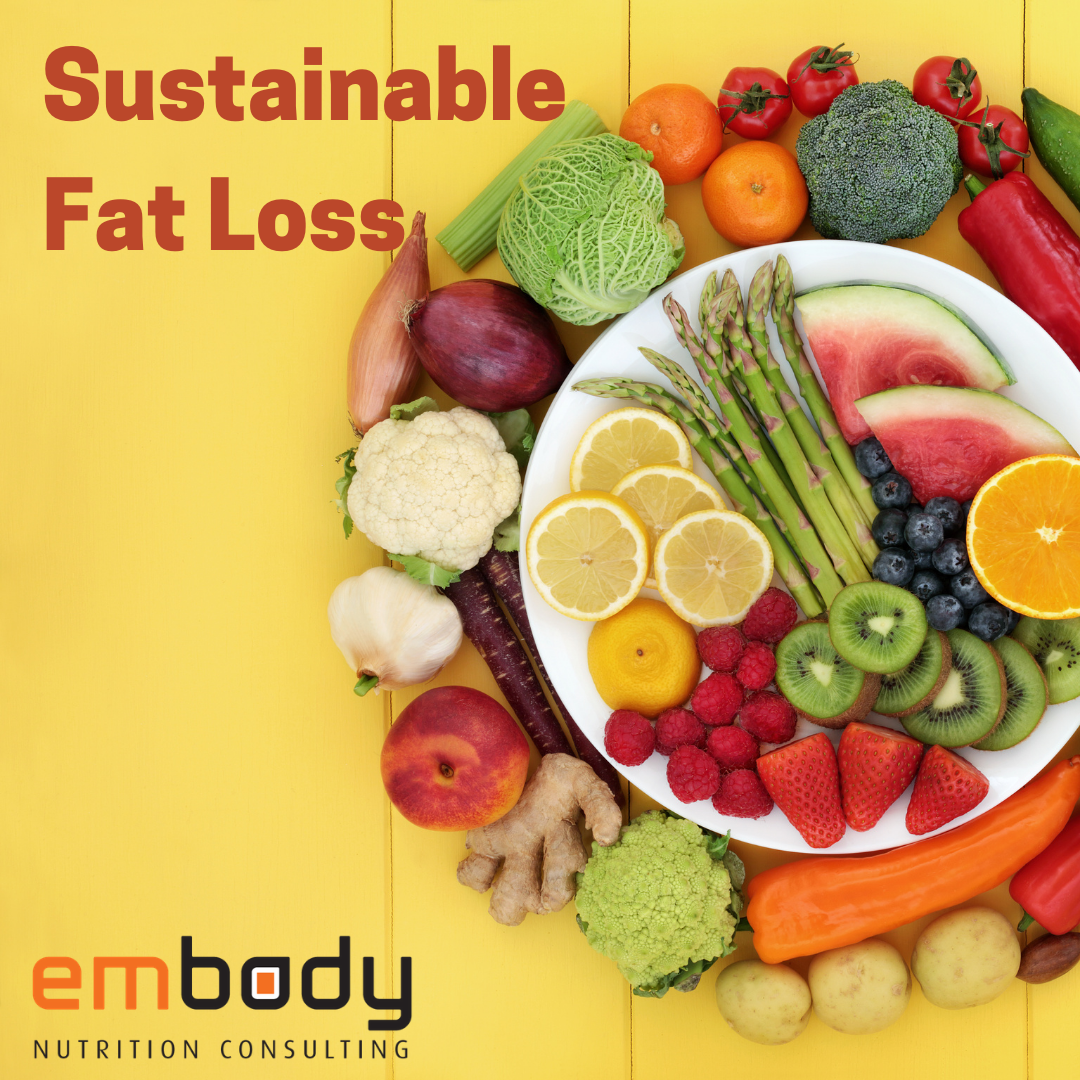Each month, we will be hosting a group coaching session within our Facebook Group and posting the notes here for your reference. We’d love for you to come and check out the group!
This month we are chatting about sustainable fat loss.
Fat loss as a goal
- Important to consider WHY you want to lose body fat. If it has anything to do with you feeling better about yourself or your body image, it will likely not help unless you do the work within to improve those issues.
- It is perfectly legitimate goal to pursue, as long as you are already in a good place with your food – you have a good relationship with food, you are not restricting your intake of food and then over eating at other times because of this.
Calorie deficit
- You need to be in a calorie deficit to lose body fat. There is no other way! Any diet works because they create a way to reduce your calorie intake.
- You can eat any way you like (2 meals per day, 6 meals per day etc) and still lose body fat as long as you are creating a calorie deficit.
How to create a calorie deficit
- The easiest way to do this is slightly reduce your intake of food throughout the day (it sounds so easy but it honestly doesn’t have to be so complicated!). You could slightly reduce your potion within your meals, you could reduce the amount of snacks you are having (not eliminate!), you could reduce your alcohol or take away food intake – the list goes on.
- You could also track your intake for a week or 2 (without changing what you eat) to see what you are currently consuming. From here – if your weight is stable – you could then reduce your calories by about 200 per day and see how that feels for you.
- Slow and steady is far better with fat loss as it means you are retaining most of your muscle mass and it means it is less stressful and you will be able to stick to it longer.
- You could also use an online calculator to get an ESTIMATE of what you need to consume, but then always make sure this feels OK for you to do long term. If it’s too hard, increase your intake until it feels easy enough (but still being mindful and restricting slightly).
Strategies to create calorie deficit
- You don’t need to track calories and you might start by reducing portions of your meals – looking at the actual amounts of protein, carbs and fats on your plate to reduce the overall energy/calories. Typically an appropriate starting place for a meal is ¼ plate protein, ¼ plate carbohydrates, ½ plate non-starchy veges + small amount added fat/flavour- something Nic & I talk about all the time you’re prob sick of it!
- It’s not all about portions though. You might look at other areas where you can reduce calories in your meals, by making some smart swaps. Some ideas are swapping for a lower calorie sauce if you’re using a lot, using a light coconut milk > full fat, swapping full fat dairy for light, swapping to lean cuts of meat/mince and using a spray oil instead of a pouring bottle to reduce the amount.
Volume eating
- A calorie deficit does not have to mean eating less food.. we still want you to feel satisfied after a meal and this is where volume eating comes in.
- Volume eating is a strategy you can use to maximise the amount of food you can eat while reducing your calorie intake to facilitate weight loss.
- The reason it works is because your stomach can only hold so much food at a time, and because calories and actual amounts of food are not directly correlated. 1kg of broccoli is going to contain less calories than 1kg of chips. So, if you prioritise lower calorie foods (for example, the broccoli) you’ll be able to eat a larger amount and feel a lot fuller. Though I do not recommend consuming 1kg of broccoli.
- When you consume energy-dense low volume foods, you may need to eat more to feel full. A good example of this might be eating a single McDonalds burger VS a large, balanced plate of food with meat, grains and lots of vegetables.
- High volume / low energy foods are typically high fibre + high water foods – like fruits and vegetables – so we definitely want to focus on eating more of these. But, you could also consider high volume / low energy foods to be lean protein, low-fat dairy sources and high fibre grains too.
Consistency
- Consistency is key when it comes to seeing the results, and it might mean results are slower than you’d like, but it also might mean the process is more enjoyable and sustainable.
- You do not need to follow the same perfect diet every day, but you do want to develop healthy habits that serve you well MOST of the time. It matters more what happens every week, every month and every year in the long-run, not what happens every day.
- We think it is important to recognise when it’s not the right time for you to be focusing on weight loss – whether there are other things going on in your life, OR you’re low in energy or it’s starting to damage your relationship with food – you need to listen to your body know it’s okay to take a break!

